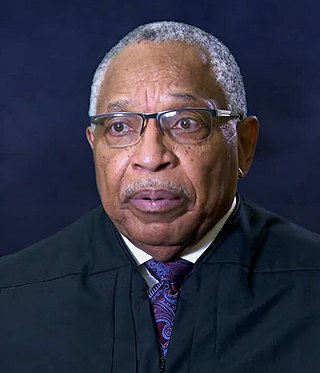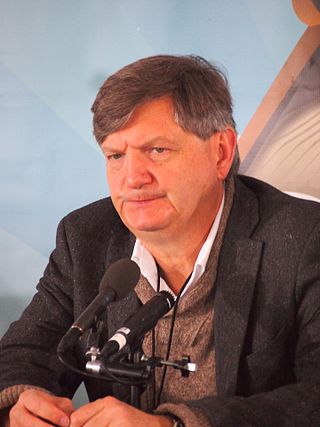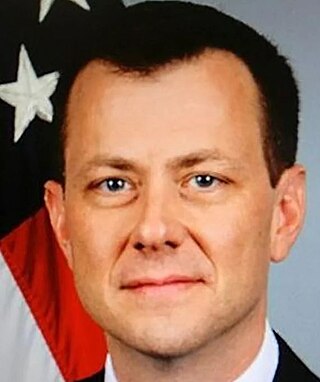Related Research Articles
The CIA leak grand jury investigation was a federal inquiry "into the alleged unauthorized disclosure of a Central Intelligence Agency (CIA) employee's identity", a possible violation of criminal statutes, including the Intelligence Identities Protection Act of 1982, and Title 18, United States Code, Section 793.

The following are controversial invocations of the USA PATRIOT Act. The stated purpose of the Act is to "deter and punish terrorist acts in the United States and around the world, to enhance law enforcement investigatory tools, and for other purposes." One criticism of the Act is that "other purposes" often includes the detection and prosecution of non-terrorist alleged future crimes.

Reggie Barnett Walton is a senior United States district judge of the United States District Court for the District of Columbia. He is a former presiding judge of the Foreign Intelligence Surveillance Court.

James Risen is an American journalist for The Intercept. He previously worked for The New York Times and before that for Los Angeles Times. He has written or co-written many articles concerning U.S. government activities and is the author or co-author of two books about the Central Intelligence Agency (CIA) and a book about the American public debate about abortion. Risen is a Pulitzer Prize winner.

James C. Goodale was the vice president and general counsel for The New York Times and, later, the Times' vice chairman.
The Reporters Committee for Freedom of the Press(RCFP) is a nonprofit organization based in Washington, D.C., that provides pro bono legal services and resources to and on behalf of journalists. The organization pursues litigation, offers direct representation, submits amicus curiae briefs, and provides other legal assistance on matters involving the First Amendment, press freedom, freedom of information, and court access issues.
Reporter's privilege in the United States, is a "reporter's protection under constitutional or statutory law, from being compelled to testify about confidential information or sources." It may be described in the US as the qualified (limited) First Amendment or statutory right many jurisdictions have given to journalists in protecting their confidential sources from discovery.

William Pelham Barr is an American attorney who served as United States attorney general in the administration of President George H. W. Bush from 1991 to 1993 and again in the administration of President Donald Trump from 2019 to 2020.

Eric Himpton Holder Jr. is an American lawyer who served as the 82nd United States attorney general from 2009 to 2015. A member of the Democratic Party, Holder was the first African American to hold the position.

The California Shield Law provides statutory and constitutional protections to journalists seeking to maintain the confidentiality of an unnamed source or unpublished information obtained during newsgathering. The shield law is currently codified in Article I, section 2(b) of the California Constitution and section 1070 of the Evidence Code. Section 1986.1 of the California Code of Civil Procedure (CCP) supplements these principal shield law provisions by providing additional safeguards to a reporter whose records are being subpoenaed.

James Michael Cole is an American attorney who served as United States Deputy Attorney General from December 29, 2010 to January 8, 2015. He was first installed as Deputy Attorney General following a recess appointment by President Barack Obama on December 29, 2010. He then was confirmed by the United States Senate in a 55–42 vote on June 28, 2011.

James Samuel Rosen is an American journalist, television correspondent, and author, who is a former Washington, D.C. correspondent for the Fox News Channel.

Gunwalking, or "letting guns walk", was a tactic used by the Arizona U.S. Attorney's Office and the Arizona Field Office of the United States Bureau of Alcohol, Tobacco, Firearms and Explosives (ATF), which ran a series of sting operations between 2006 and 2011 in the Tucson and Phoenix area where the ATF "purposely allowed licensed firearms dealers to sell weapons to illegal straw buyers, hoping to track the guns to Mexican drug cartel leaders and arrest them" - however as of October 2011, none of the targeted high-level cartel figures had been arrested. These operations were done under the umbrella of Project Gunrunner, a project intended to stem the flow of firearms into Mexico by interdicting straw purchasers and gun traffickers within the United States. The Jacob Chambers Case began in October 2009 and eventually became known in February 2010 as Operation Fast and Furious after agents discovered Chambers and the other suspects under investigation belonged to a car club.

Matt Apuzzo is an American journalist working for The New York Times.

Jeffrey Adam Rosen is an American lawyer who served as acting United States attorney general from December 2020 to January 2021 and as United States deputy attorney general from 2019 to 2020. Before joining the Department of Justice, he was a senior partner at the law firm Kirkland & Ellis and was the United States deputy secretary of transportation.

John Charles Demers is an Italian-born American lawyer who served as United States Assistant Attorney General for the National Security Division (NSD) from 2018 to 2021. Following the resignation of Jeffrey A. Rosen, Demers also served as acting United States Attorney General for a few hours on January 20, 2021 until President Joe Biden signed an executive order naming Monty Wilkinson as acting United States Attorney General later that day.

Peter Paul Strzok II is a former United States Federal Bureau of Investigation (FBI) agent. He was the Deputy Assistant Director of the FBI's Counterintelligence Division and led the investigation into Russian interference in the 2016 United States elections. Previously, he had been the chief of the division's Counterespionage Section and led the investigation into Hillary Clinton's use of a personal email server.
This is a timeline of events from 2020 to 2022 related to investigations into the many suspicious links between Trump associates and Russian officials and spies relating to the Russian interference in the 2016 United States elections. It follows the timeline of Russian interference in the 2016 United States elections, both before and after July 2016, until November 8, 2016, election day, the transition, the first and second halves of 2017, the first and second halves of 2018, and the first and second halves of 2019.
The United States Department of Justice under the Trump administration acquired by a February 2018 subpoena the Apple iCloud metadata of two Democrats on the House Intelligence Committee, several others associated with the committee, and some of their family members. The subpoena covered 73 phone numbers and 36 email addresses since the inception of the accounts. Seizing communications information of members of Congress is extraordinarily rare. The department also subpoenaed and obtained 2017 and 2018 phone log and email metadata from news reporters for CNN, The Washington Post and The New York Times. Apple also received and complied with February 2018 subpoenas for the iCloud accounts of White House counsel Don McGahn and his wife. Microsoft received a subpoena relating to a personal email account of a congressional staff member in 2017.

The United States Justice Department investigation into attempts to overturn the 2020 presidential election began in early 2021 with investigations and prosecutions of hundreds of individuals who participated in the January 6, 2021 attack on the United States Capitol. By early 2022, the investigation had expanded to examine Donald Trump's inner circle, with the Justice Department impaneling several federal grand juries to investigate the attempts to overturn the election. Later in 2022, a special counsel was appointed. On August 1, 2023, Trump was indicted. The indictment also describes six alleged co-conspirators.
References
- ↑ Ingram, David (May 13, 2013). "Associated Press says U.S. government seized journalists' phone records". Reuters Canada. Archived from the original on May 29, 2014. Retrieved May 15, 2013.
- ↑ Gallagher, Ryan (May 16, 2013). "Verizon Wireless Secretly Passed AP Reporters' Phone Records to Feds". www.slate.com. Retrieved May 20, 2013.
- ↑ Sanchez, Raf (May 13, 2013). "US Justice Department secretly seizes Associated Press phone records". The Telegraph. Retrieved May 15, 2013.
- ↑ Washington (AP) (May 13, 2013). "US government secretly obtained Associated Press phone records". The Guardian. Retrieved May 15, 2013.
- 1 2 Matt Smith and Joe Johns (May 14, 2013). "AP blasts feds for phone records search". CNN. Retrieved May 15, 2013.
- ↑ Gary B. Pruitt (May 13, 2013). "AP letter to Eric Holder on seizure of phone records". USA Today. Retrieved June 1, 2013.
- ↑ Charlie Savage and Scott Shane (May 14, 2013). "Verizon Wireless Secretly Passed AP Reporters' Phone Records to Feds". The New York Times . Retrieved May 20, 2013.
- 1 2 Marimow, Ann E. (May 19, 2013). "A rare peek into a Justice Department leak probe". The Washington Post. Retrieved May 20, 2013.
- ↑ FoxNews.com (May 20, 2013). "Justice Department affidavit labels Fox News journalist as possible 'co-conspirator'". Fox News. Retrieved July 16, 2013.
- ↑ Rove, Karl (May 24, 2013). "Did Holder mislead Congress about targeting reporters like James Rosen?". Fox News. Retrieved May 31, 2013.
- ↑ Aamer Madhani and Kevin Johnson (May 21, 2013). "Are Justice Department leak probes causing a chill?". USA Today. Retrieved June 1, 2013.
- ↑ Glenn Greenwald (May 20, 2013). "Obama DOJ formally accuses journalist in leak case of committing crimes". The Guardian. Retrieved June 1, 2013.
- ↑ "'How Does Jay Carney Sleep at Night?': Napolitano, Kilmeade Discuss James Rosen Probe". Fox News Insider. May 21, 2013. Archived from the original on July 16, 2013. Retrieved July 16, 2013.
- ↑ "Another Chilling Leak Investigation" . The New York Times . May 21, 2013. Retrieved July 16, 2013.
- ↑ Dana Milbank (May 21, 2013). "In AP, Rosen investigations, government makes criminals of reporters". The Washington Post . Archived from the original on May 26, 2013. Retrieved July 16, 2013.
- ↑ Curry, Tom (May 14, 2013). "Holder addresses AP leaks investigation, announces IRS probe". NBC News. Retrieved June 1, 2013.
- ↑ Charlie Savage and Jonathon Weisman (May 29, 2013). "Holder Faces New Round of Criticism After Leak Inquiries". The New York Times . Retrieved June 1, 2013.
- ↑ Isikoff, Michael (May 27, 2013). "DOJ confirms Holder OK'd search warrant for Fox News reporter's emails". NBC News. Retrieved June 1, 2013.
- ↑ FoxNews.com (May 29, 2013). "House Republicans challenge Holder testimony on reporter surveillance". Fox News. Retrieved June 1, 2013.
- ↑ Carol D. Leonnig and Julie Tate (May 15, 2013). "Government Spying on Fox News Reporter Even Worse Than AP case". The Washington Post . Retrieved May 16, 2013.
- ↑ Erik Wemple (June 19, 2013). "AP chief: Intrusive government is chilling journalism". The Washington Post . Retrieved July 16, 2013.
- ↑ "Report on Revised Media Guidelines" (PDF). Attorney General selected publications. US Dept of Justice. July 12, 2013. Retrieved April 16, 2014.
- ↑ "Statement of Attorney General Eric Holder on the Justice Department Report on Revised Media Guidelines". press release 13-783. US Dept of Justice. July 12, 2013. Retrieved April 16, 2014.
- ↑ Leonard Downie Jr. with reporting by Sara Rafsky (October 10, 2013). "The Obama Administration and the Press". Committee to Protect Journalists. Retrieved February 14, 2015.
- ↑ "Holder Signs Final Rules Regarding Obtaining Information from Journalists". JD Journal. February 24, 2014. Retrieved February 24, 2014.